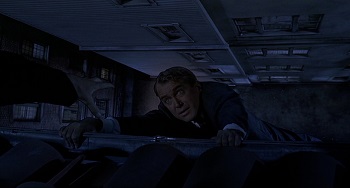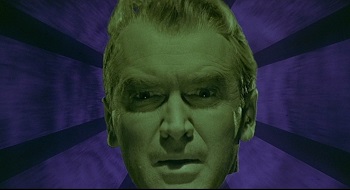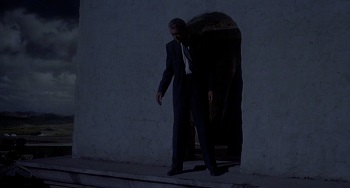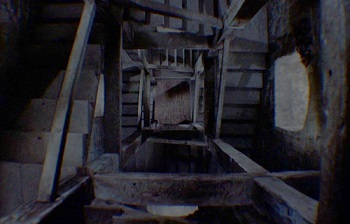"One doesn't often get a second chance. I want to stop being haunted. You're my second chance..."
While praised as one of, if not Hitchcock's greatest achievement, Vertigo seems to also be the most controversial and most alienating of his filmography. Within this film, the auteur delved deep within uncharted waters, and like most of his most praised work, was full of incredibly ballsy subject matter for its time.
Obsession is a theme explored by many directors, even long before Hitchcock made a name for himself, but it had never been explored like this.  This is a primal, sexual obsession of the most disturbing kind, and in true film noir fashion, we are left with a bleak, unforgiving climax devoid of heroism. The first time I watched Vertigo, I was quite disappointed and found it to be one of my least favorite Hitchcock films. I found the villain to be underwhelming, the romance unconvincing and the character of Scottie too unnerving to sympathize with. In other words, I walked into this film with a completely wrong frame of mind.
This is a primal, sexual obsession of the most disturbing kind, and in true film noir fashion, we are left with a bleak, unforgiving climax devoid of heroism. The first time I watched Vertigo, I was quite disappointed and found it to be one of my least favorite Hitchcock films. I found the villain to be underwhelming, the romance unconvincing and the character of Scottie too unnerving to sympathize with. In other words, I walked into this film with a completely wrong frame of mind.
First off the "villain" of this story is heavily in contrast with the sort of memorable villains Hitchcock has pioneered over the years. Also, the villain is not the character we believe them to be. Sure, his intentions are revealed in a plot twist that only exists within a memory and said memory is the last time we ever see him onscreen, but that is part of the film's deception. The villain is not the real villain. James Stewart plays Scottie, a former police detective who has been traumatized after almost falling off a building. A fellow officer tries to save him and falls off to his death and Scottie witnesses this. The trauma of almost falling to his own death mixed with seeing this man die and the guilt of feeling responsible for his death has made him no longer capable of doing his job. He suffers from an intense fear of heights (vertigo) that makes him unable to even walk up a staircase without becoming disoriented and sometimes prone to fainting. Midge, Scottie's former flame, is very compassionate and tries her best to help him overcome his vertigo.
One day, Scottie is contacted by an old friend, the wealthy Gavin Elster. In true film noir fashion, Gavin persuades Scottie to follow his wife, Madeleine, but not for the reasons one would believe. Gavin isn't questioning his wife's loyalty. His reasons are much more baffling. He believes that his wife is possessed by the spirit of her ancestor. This ancestor was a wealthy woman who committed suicide, and Gavin fears that Madeleine may suffer the same fate. Scottie is obviously unconvinced by Gavin's suspicions, but still takes the job on as a favor to his friend.
Scottie tails Madeleine and through his investigation becomes rather baffled himself.  His spying on her also spurs a sexual lust for her that only intensifies the more he watches her. He is mystified by her looks and her manner. This is not at all the obligatory romance I thought it was on the first viewing. It's hard to review a film like Vertigo without giving away most of the plot, so I will do my best to condense. Scottie eventually becomes involved with Madeleine and even becomes convinced that she is indeed possessed and attempts to help her the best way he can. This only intensifies his infatuation and she in turn becomes drawn to his devotion and desire but this is not enough to save her. Madeleine is suicidal and as she runs up a flight of stairs to plunge to her inevitable death, Scottie's vertigo gets the better of him. Scottie is defeated by Scottie. Much like the beginning of the film, he is overpowered by guilt and trauma. He becomes shameful and depressed and can't stand to be around anyone, losing the will to exist. Scottie is haunted.
His spying on her also spurs a sexual lust for her that only intensifies the more he watches her. He is mystified by her looks and her manner. This is not at all the obligatory romance I thought it was on the first viewing. It's hard to review a film like Vertigo without giving away most of the plot, so I will do my best to condense. Scottie eventually becomes involved with Madeleine and even becomes convinced that she is indeed possessed and attempts to help her the best way he can. This only intensifies his infatuation and she in turn becomes drawn to his devotion and desire but this is not enough to save her. Madeleine is suicidal and as she runs up a flight of stairs to plunge to her inevitable death, Scottie's vertigo gets the better of him. Scottie is defeated by Scottie. Much like the beginning of the film, he is overpowered by guilt and trauma. He becomes shameful and depressed and can't stand to be around anyone, losing the will to exist. Scottie is haunted.
It goes without saying that seeing someone you care so much about die in front of you is indeed traumatizing, and being haunted by seeing the person you love now dead before you, someone who depended on you and you cannot help but be consumed by the guilt and what you perceive as failing at your responsibility. You can't help but feel like, had you put more effort toward them, that they might still be alive. It isn't until you have experienced this yourself that you will ever be able to understand what it is like to truly be haunted by what you saw and the guilt of feeling you were somewhat responsible, even when it was completely unavoidable and out of your hands. It is an unbearable feeling that affects both your mental and physical health; it is a sickness that infects you. You cannot help but alienate yourself as well as the people around you to the point that everyone in your life feels helpless. It changes you, and in most cases, can defeat you.
This is what Scottie goes through. I suppose going through the same is why I understand it so much more now. I'm not at all comparing myself to Scottie, nor am I suggesting that it takes going through what I just described to fully appreciate this film, but if I must review this subjectively, then I must reveal what plays into what I think makes Vertigo such a masterpiece in storytelling.
As Scottie begins to recover, he is able to go out in public and does his best to exist within society. As things start to pick up for him, every potential of pulling through this trauma comes crashing down the day he meets Judy, a seemingly innocent woman who is an identical dead ringer for the deceased Madeleine.  Scottie is immediately hypnotized and drawn into Judy. He cannot take his eyes off her. He is magnetized, addicted and like his feelings for Madeleine, becomes consumed by her presence. He needs to be with her as much as possible. He becomes obsessed. So obsessed, that he even begins to slowly and forcibly mold Judy into Madeleine. I believe this is part of what detracted me from the first viewing. I always found Jimmy Stewart to be one of the most charming and likable actors of that time and it felt unnerving to watch him transform into this sick mind consumed by his obsession. He is fixated on a dead woman. He becomes a victim of his own thoughts, and through becoming that victim, the protagonist in turn becomes the antagonist.
Scottie is immediately hypnotized and drawn into Judy. He cannot take his eyes off her. He is magnetized, addicted and like his feelings for Madeleine, becomes consumed by her presence. He needs to be with her as much as possible. He becomes obsessed. So obsessed, that he even begins to slowly and forcibly mold Judy into Madeleine. I believe this is part of what detracted me from the first viewing. I always found Jimmy Stewart to be one of the most charming and likable actors of that time and it felt unnerving to watch him transform into this sick mind consumed by his obsession. He is fixated on a dead woman. He becomes a victim of his own thoughts, and through becoming that victim, the protagonist in turn becomes the antagonist.
Despite everything we see Scottie go through and endure, it still is difficult to be entertained and sit through what he becomes in the film's second half. He is not a despicable man, but a sick one, and one can't help but be disturbed and alienated by what is going on in his head. Despite all of this heavy content, the mystery continues to unravel, as Scottie is still in detective mode and by the time everything comes together, the two central characters are placed in an intense situation that is by their own doing. We are left with an ending that is abrupt, but with a purpose. There need not be any more story to tell. It just ends, and that last image is left burned into our minds. Vertigo is most certainly the kind of film that sticks with you long after it ends. You can't help but repeat it through your mind and try to get a grip on understanding it. While the first half is told in a somewhat traditional manner for a detective story, the second completely turns those conventions on their head. It is a fascinating look into what trauma and obsession can do to the human mind, how it can terrorize your own sense and turn you against the world, most especially the ones closest to you and it is an intriguing and incredible look into what causes the human mind to get to such a destructive low.  Scottie is so obsessed with this woman that after her death, he is given what he sees as a second chance with her and it is absolutely disturbing to watch how driven he is to bring her back from the dead.
Scottie is so obsessed with this woman that after her death, he is given what he sees as a second chance with her and it is absolutely disturbing to watch how driven he is to bring her back from the dead.
Outside of the story, the music and visuals are another of the key aspects into what makes this film such a masterpiece. I believe this to be Bernard Herrmann's greatest soundtrack of all his Hitchcock collaborations. I also think this is one of Hitchcock's best looking films. The contrast of colors in each scene are lush and entrancing. There are certain scenes with this slightly blurred hue that helps create this dreamlike aura around each shot. Perhaps the most standout segment is the sequence where we enter Scottie's mind as it unravels into a bizarre hallucinatory nightmare, predating and most unquestionably having an impacting influence on the psychedelic era of 60's cinema. It really is his most colorful film, which I find incredibly ironic, as this is quite possibly the bleakest, darkest and roughest film from The Master of Suspense.
I have debated this film with many people in the past who I could relate with in coming out of Vertigo the first time, but that rewatch was necessary and I have revisited this many times since then. As much as I love Rear Window, seeing Vertigo again restored in me why this is my favorite film from Hitchcock. Watch it again and leave your mind open to this unforgivable and psychological deconstruction of what is arguably considered his best film.
Please feel free to discuss "Vertigo" here, in our forums!

